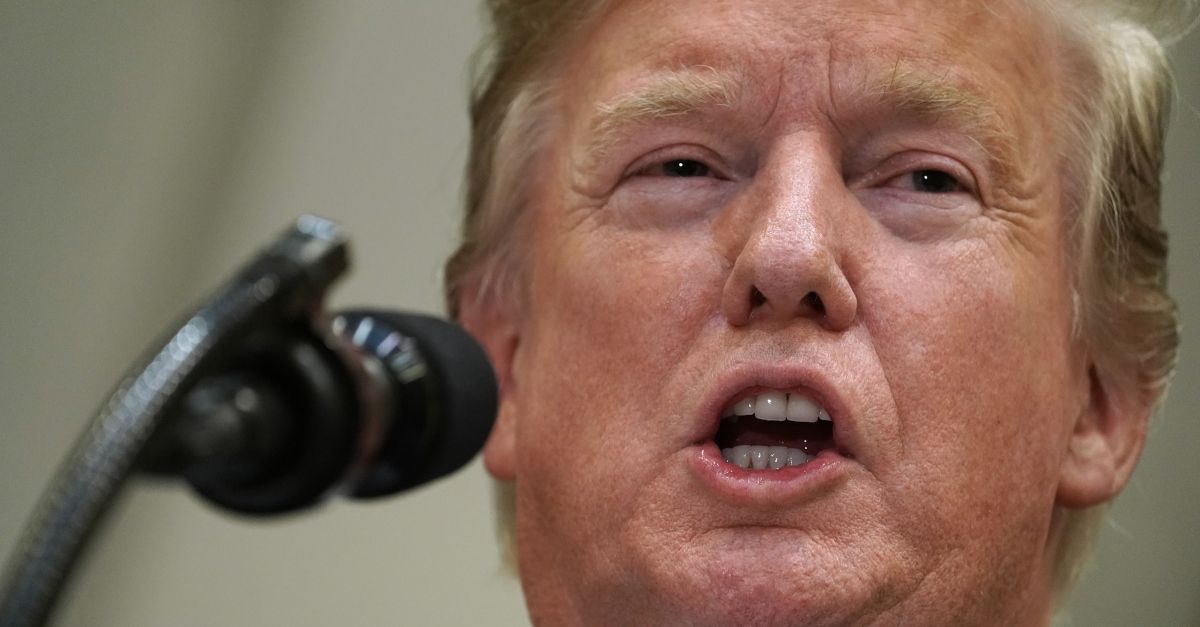
Attorneys for President Donald Trump as private citizen accused New York Attorney General Letitia James and Commissioner of the New York State Department of Taxation and Finance Michael Schmidt on Monday of “conspiring” with congressional co-defendants, the House Ways and Means Committee, for the purpose of exposing Trump’s tax returns.
The claim came in a 44-page memorandum in opposition to the New York defendants’ motion to dismiss on grounds of “lack of personal jurisdiction and improper venue.” Trump attorneys were pretty clear about their position on this from the start.
“The New York Defendants’ description of this case is unmoored from reality. This is not an action by ‘a New York tax return filer’ against ‘New York officials’ to ‘challenge the constitutionality of a New York statute governing the treatment of New York tax information,'” they argued. “It is an action by the sitting President of the United States against a committee of Congress to challenge its constitutional authority to obtain his private tax information.”
Some background: The lawsuit came in the aftermath of New York Gov. Andrew Cuomo (D) signing the TRUST Act into law, legislation aimed at giving Congress the “ability to fulfill its Constitutional responsibilities to strengthen our democratic system and ensure that no one is above the law,” namely access to Trump’s state tax returns. New York state Sen. Brad Hoylman (D), for his part, described the TRUST Act as “a constitutional escape hatch should [House Democrats] not want to wait for the federal court case and its appeals process to be finalized.”
The TRUST Act was a response to Trump resisting the release of his tax returns (claiming that they were under audit) and suing to block the congressional subpoena from the House Ways and Means Committee and its Chairman Rep. Richard Neal (D-Mass.). Neal sought to obtain Trump’s federal tax returns from the Treasury Department, but hit a legal wall.
Trump lawyers argued on Monday that the U.S. District Court for the District of Columbia “should deny New York Defendants’ motion to dismiss for three reasons.” The first reason offered was the said motion was “premature,” as the president is entitled to discovery — particularly, “jurisdictional discovery under a ‘conspiracy theory'” [citations removed]:
No one questions this Court’s personal jurisdiction over the Congressional Defendants, who will request, review, use, and potentially disclose the President’s state tax returns in D.C. But if the New York Defendants are conspiring with the Congressional Defendants, all of that conduct can be attributed to the New York Defendants too. And they are conspiring. As the President has explained, the Attorney General—after running a campaign where she pledged to help House Democrats expose the President’s financial information—is coordinating with the House and duplicating its subpoenas with subpoenas of her own. Notably, while the New York Defendants deny several of the President’s jurisdictional allegations in their motion, they say nothing about this allegation. They tacitly concede that the Attorney General is “closely coordinating with House Democrats in a joint effort to obtain and expose the President’s financial information.”
The second reason: If jurisdiction and venue really “must be decided now, they should be resolved in the President’s favor.” Why? Because the defendants have “concocted a plan” to hand over Trump’s state tax returns to D.C. “with the intent to injure him there, working in close coordination with Congress.” Trump lawyers argued that, because of this, the defendants shouldn’t “complain” about being dragged into D.C. court. The plaintiff called the defendants’ attempt to move the case to the Southern District of New York “baseless.”
The third reason: “[D]ismissing the New York Defendants” wouldn’t be meaningful because Trump will continue to challenge the constitutionality of the TRUST Act and the defendants “would likely rejoin this case as intervenors” anyway.
Trump attorneys previously called the TRUST Act a political attack on the president in violation of his First Amendment right not to be tormented by “laws enacted for the purpose of discriminating or retaliating against an individual for his politics or speech.” The lawsuit also claimed that defendants violated “Article I of the Constitution and the House Rules.” They pointed to the statements of New York legislators to show that the TRUST Act is a politically-motivated piece of legislation:
New York legislators admitted that the TRUST Act’s purpose was to help the Committee expose the President’s private tax information for political gain; its purpose was their purpose. And New York Democrats designed the TRUST Act to be a complement to the Committee’s litigation over the President’s federal tax returns—a “workaround,” an “‘in case of emergency break glass’” option, a “constitutional escape hatch should [the Committee] not want to wait for the federal court case and its appeals process to be finalized.” The TRUST Act also grew out of a larger campaign in New York to uncover and expose the President’s private financial information in the hopes of damaging him politically.
A number of NY AG Letitia James’s past tweets and public statements made an appearance under the memorandum’s table of “Other Authorities” — that is, authorities other than case law. Each of the select tweets were composed before James was elected AG, which happened on Nov. 6, 2018.
Trump attorneys slam NY AG by Law&Crime on Scribd
(H/t Law.com)
[Image via Chip Somodevilla/Getty Images]